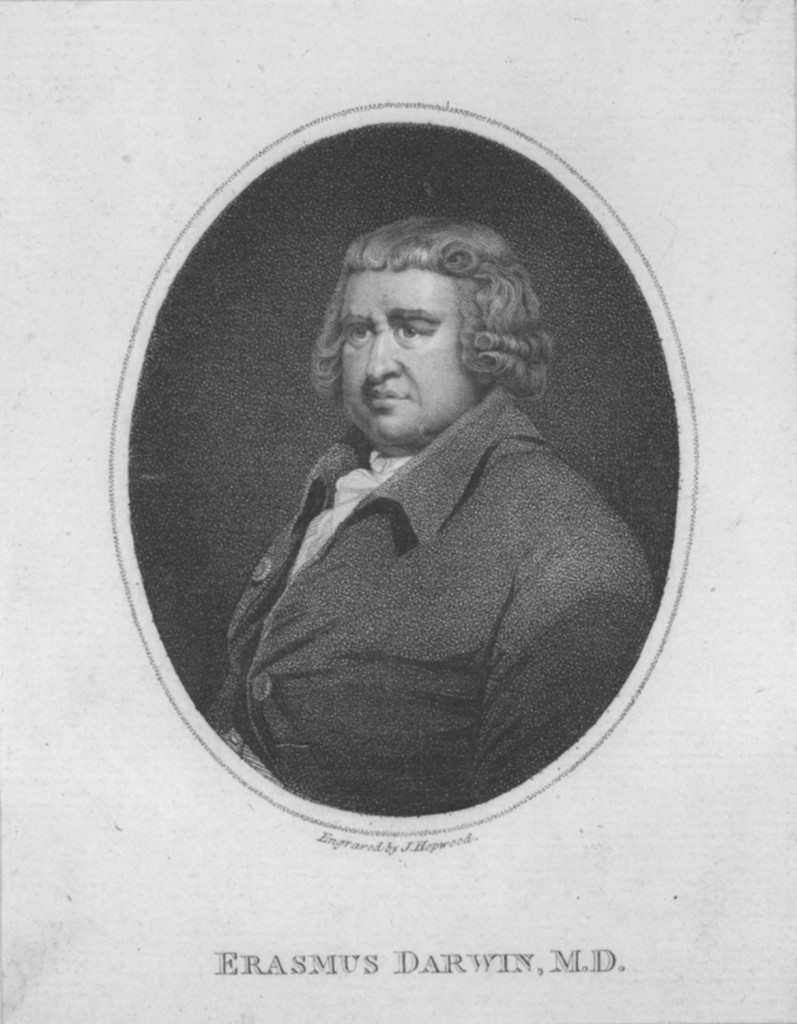A Portrait of Dr. Erasmus Darwin
Erasmus Darwin: Doctor, Inventor, Poet and Educationalist
Erasmus Darwin was born at Elston, near Nottingham, in 1731 where his family were members of the local gentry. In 1750 he enrolled at Cambridge University and in 1753 he moved to Edinburgh, where he trained as a doctor. In 1756 Darwin started a medical practice in Lichfield, where he married Mary Howard and had five children. His son, Robert Waring, was to become the father of Charles Darwin.
Darwin was a key member of Lichfield’s intellectual elite. He supported Anna Seward’s literary ambitions, but was an obvious rival for the writer, Samuel Johnson, who was born in Lichfield. Darwin’s medical practice extended over the West Midlands and he became friends with other Lunar Society figures. His correspondence and Commonplace Book reveal his scientific interests which included copying machines, carriage design, canal technology, reproduction, mental illness and meteorology. His sense of humour and ability to support his friends – he was also physician to many of them – meant that he was crucial in creating a productive atmosphere at Lunar meetings.
His wife, Mary, died in 1770 and in 1781 Darwin married a widow, Elizabeth Pole and moved to her home at Radburn Hall in Derbyshire. In the following year he moved to Derby, where he re-established his medical practice. They had seven children and the household included Elizabeth’s three children from her earlier marriage, Darwin’s three surviving offspring from Mary and his two illegitimate daughters.
Between 1783 and 1800 he published a series of books establishing his reputation as a scientist, poet, and educator:
• A System of Vegetables (1783) and The Families of Plants (1787), translations of work by the Swedish botanist, Linnaeus.
• The Botanic Garden (1789-1791), a poem celebrating science and industrialisation, but also exploring social concerns such as anti-slavery.
• Zoonomia; or the laws of Organic Life (1792-1796)
• A Plan for the Conduct of Female Education in Boarding Schools (1797)
• Phytologia; or, The Philosophy of Agriculture and Gardening (1800)
• The Temple of Nature; or the Origin of Society (1806-1807), was published after his death.
Darwin directed his energies in many directions. His scientific interests, his skill as a doctor – he was once asked to become George III’s personal physician – and his vast scientific expertise – and his social and literary interests mark him as a major figure of the Enlightenment. The theory of evolution owes a great deal to Erasmus Darwin’s thought and investigations.
Sources and Further ReadingKing-Hele, Desmond (ed.), Essential Writings of Erasmus Darwin (London, MacGibbon and Kee, 1968) King-Hele, Desmond (ed.), The Letters of Erasmus Darwin (Cambridge, Cambridge University Press, 1981) King-Hele, Desmond, Erasmus Darwin: A Life of Unequalled Achievement (London, Giles de al Mare, 1999) King-Hele, Desmond (ed.), Charles Darwin’s Life of Erasmus Darwin (Cambridge, Cambridge University Press, 2003) McNeil, Maureen, Under the Banner of Science: Erasmus Darwin and his Age(Mancherster, Manchester University Press, 1987) Schofield, Robert E., The Lunar Society, A Social History of Provincial Science and Industry in Eighteenth Century England (Oxford, Clarendon Press, 1963) Uglow, Jenny, The Lunar Men: The Friends who made the Future 1730-1810 (London, Faber and Faber, 2002)






